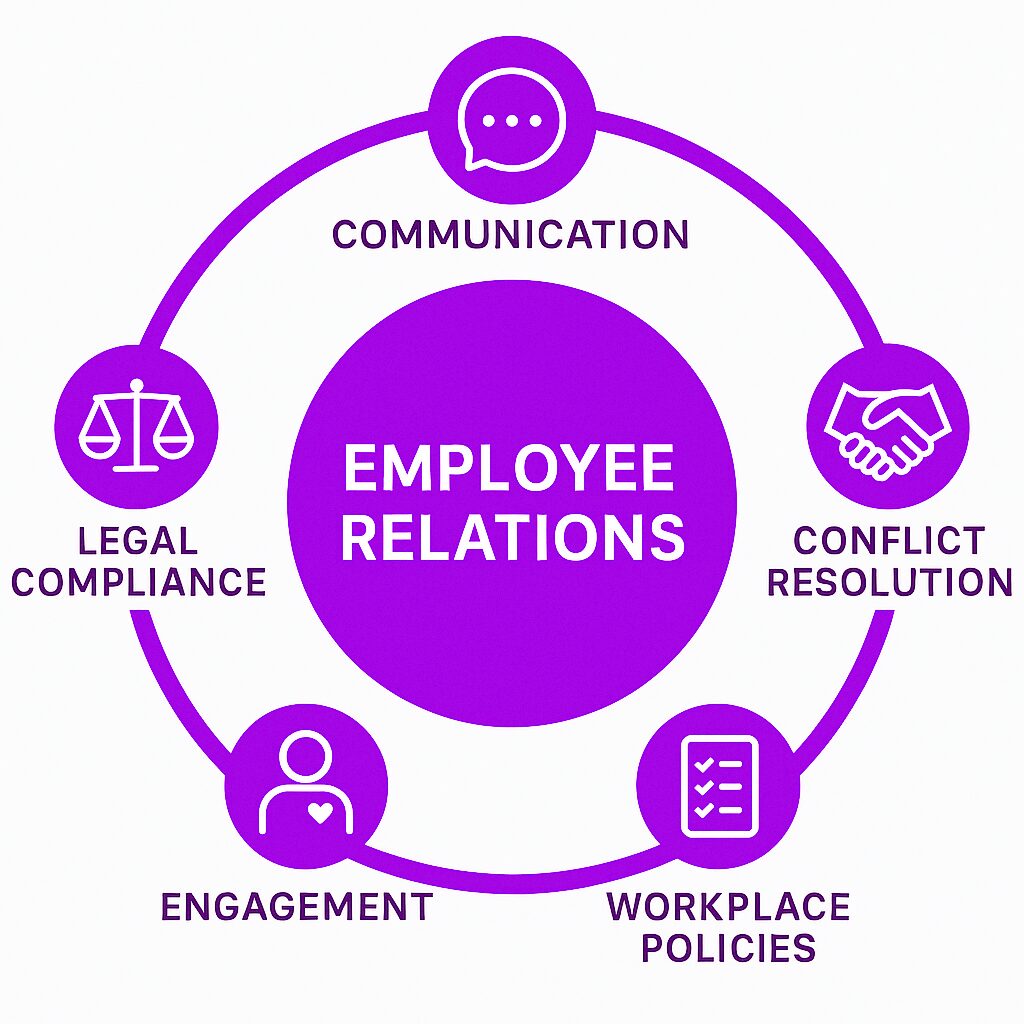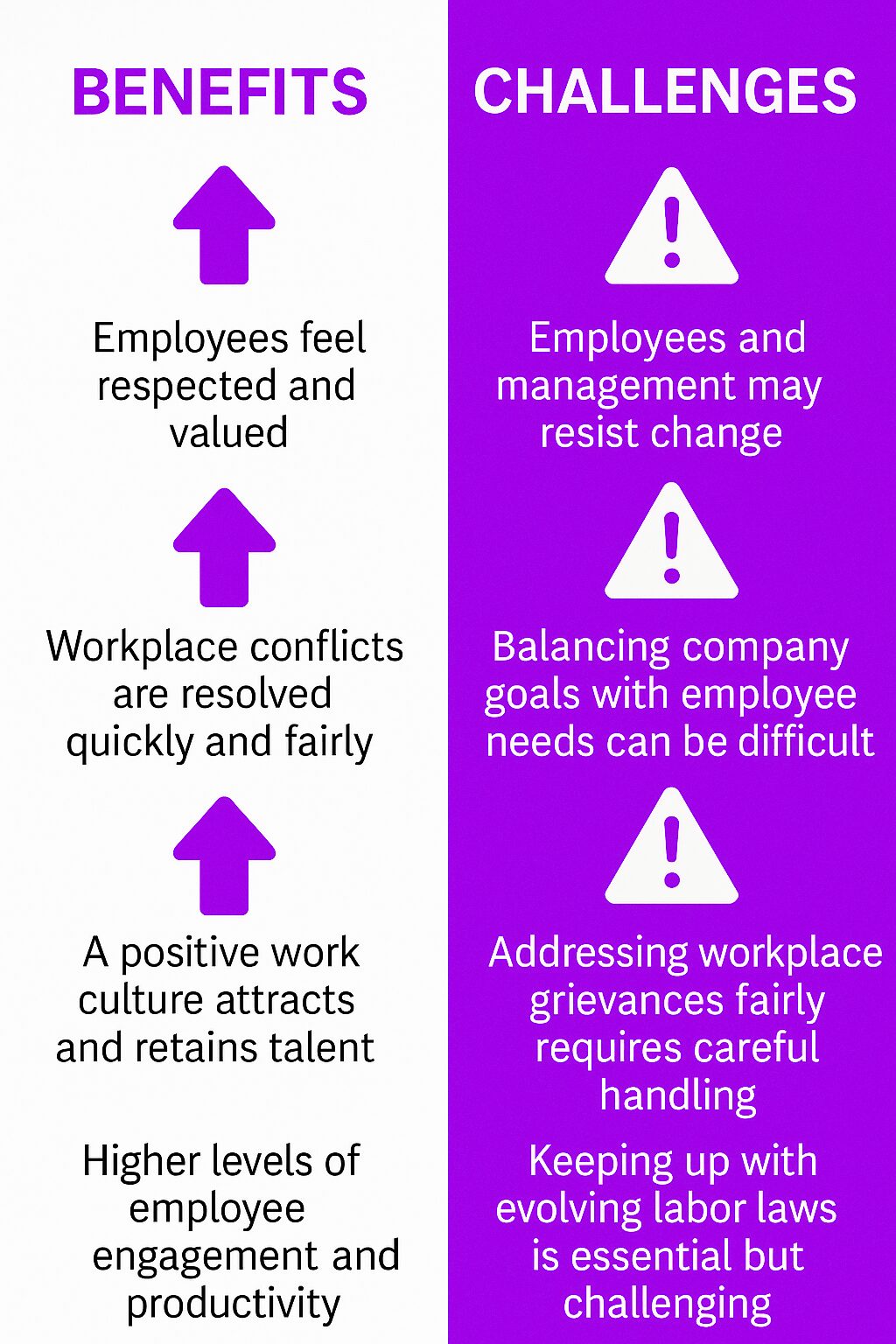What Is Employee Relations?
Employee relations entails the relationship between employers and employees in the workplace. It includes communication, conflict resolution, workplace policies, and the overall experience employees have with their organization.
Good employee relations build trust, improve job satisfaction, and help companies maintain a positive work culture. When employees feel valued and heard, they are more engaged and productive.
The Role of Employee Relations in the Workplace
The focus of employee relations has shifted from simply managing disputes to fostering collaboration and engagement.
A well-defined employee relations strategy is essential for balancing the needs of both employers and employees.
Companies invest in employee relations strategies to:
-
Build strong communication between management and employees.
-
Resolve workplace conflicts fairly.
-
Ensure policies are clear and consistently applied.
-
Improve retention and job satisfaction.
-
Create a positive and inclusive work culture.
Key Components of Employee Relations
Communication
Effective communication is the foundation of strong employee relations. Employees need clear expectations, feedback, and open channels to voice concerns. Regular meetings, one-on-ones, and employee surveys help management stay connected with their teams. Effective communication is crucial for fostering positive employee relations.
Conflict Resolution
Disputes are inevitable in any workplace. Addressing employee relations issues promptly is essential to maintaining a positive work environment. Having a structured process for handling disagreements prevents small issues from escalating. Companies use mediation, HR interventions, and open-door policies to resolve conflicts fairly.
Workplace Policies
Clear policies create a sense of fairness. Employee handbooks outline expectations, company rules, and procedures for handling grievances. These policies must align with labor laws and be communicated effectively to all employees.
Employee Engagement
Engaged employees are motivated, productive, and committed to their work. Companies use recognition programs, career development opportunities, and work-life balance initiatives to boost engagement.
Monitoring employee relations efforts through surveys and feedback can significantly boost engagement.
Legal Compliance
Organizations must follow labor laws related to wages, discrimination, and workplace safety. Staying compliant protects the company from legal risks and ensures fair treatment for employees. Ensuring legal compliance is fundamental to build positive employee relations.
Employee Relations Management
Employee relations management is a cornerstone of effective human resource management, focusing on fostering and maintaining positive relationships between employers and employees. This proactive approach is essential for building trust, enhancing communication, and boosting employee engagement and productivity.
At its core, employee relations management involves understanding the needs and concerns of employees, addressing conflicts and issues promptly, and developing strategies to improve overall employee relations. By creating a positive work environment, promoting open communication, and encouraging employee feedback, organizations can prevent many conflicts and issues from arising in the first place.
Employee relations managers play a pivotal role in this process. They are responsible for developing and implementing employee relations strategies, working closely with HR professionals, managers, and employees to ensure that these efforts are effective. Their goal is to build positive relationships within the workplace, which in turn leads to a more engaged and productive workforce.
Effective employee relations management is not just about resolving conflicts; it’s about creating a culture where employees feel valued and heard. This involves regular check-ins, feedback sessions, and open-door policies that allow employees to voice their concerns and suggestions. By prioritizing these efforts, companies can improve employee relations, leading to higher job satisfaction, better retention rates, and a stronger company culture.
Why Employee Relations Matters
Strong employee relations impact every aspect of a business. Companies that invest in employee relations see:
-
Higher productivity: Employees work harder when they feel valued.
-
Better retention: A positive work environment reduces turnover.
-
Improved morale: Employees are more satisfied and motivated.
-
Stronger teamwork: Trust and collaboration improve workplace relationships.
-
Legal protection: Following labor laws prevents disputes and lawsuits.
Investing in employee relations helps create a positive company culture that attracts and retains talent.
Poor employee relations, on the other hand, lead to high turnover, low engagement, and workplace conflicts. A toxic work environment can damage a company’s reputation and make it difficult to attract top talent.
Benefits and Challenges of Employee Relations
Benefits of Positive Employee Relations
-
Employees feel respected and valued.
-
Workplace conflicts are resolved quickly and fairly.
-
A positive work culture attracts and retains talent.
-
Higher levels of employee engagement and productivity.
-
Stronger communication reduces misunderstandings and grievances.
-
Examples of employee relations benefits include higher engagement and better retention.
Challenges
-
Employees and management may resist change.
-
Balancing company goals with employee needs can be difficult.
-
Addressing workplace grievances fairly requires careful handling.
-
Keeping up with evolving labor laws is essential but challenging.
-
Managing generational and cultural differences in the workplace.
Practical Tips for Improving Employee Relations Strategy
Encourage Open Communication
Give employees a voice. Hold regular check-ins, encourage feedback, and use anonymous surveys to gauge employee sentiment.
Provide Conflict Resolution Training
Train managers and HR teams to handle workplace disputes professionally. Mediation and fair resolution practices build trust in leadership. An employee relations manager can play a crucial role in providing conflict resolution training.
Recognize and Reward Employees
Acknowledging hard work improves morale. Implement recognition programs, bonuses, or simple appreciation gestures to show employees their contributions matter.
Offer Career Development Opportunities
Employees who see a future with the company are more likely to stay. Provide training, mentorship, and growth opportunities to keep employees engaged.
Ensure Workplace Policies Are Clear and Fair
Policies should be transparent, easily accessible, and consistently enforced. Employees need to understand their rights and responsibilities.
Support Work-Life Balance
Flexible work arrangements, mental health resources, and wellness programs contribute to a healthier, more engaged workforce.
Related Concepts
Employee Engagement
Engagement refers to the emotional commitment employees have toward their work. It directly impacts motivation and performance.
Employee Advocacy and the Role of Employee Relations Manager
Advocacy programs encourage employees to be brand ambassadors, promoting the company positively both internally and externally.
Employee Well-being
Physical, mental, and emotional health initiatives improve job satisfaction and reduce burnout.
Industrial Relations
Industrial relations focus on labor unions, collective bargaining, and formal agreements between employees and employers. HR and employee relations are critical in navigating the complexities of industrial relations.
Real-World Examples
Improving Retention Through Feedback
A software company struggling with high turnover implemented quarterly employee feedback sessions. Employees felt heard, and management made meaningful changes, reducing turnover by 25% in a year.
Resolving Workplace Disputes Fairly
A retail company introduced mediation for handling disputes. Instead of escalating to HR immediately, trained mediators helped employees work through disagreements, leading to fewer complaints and better relationships.
Using Recognition to Boost Morale
A healthcare provider launched a peer-recognition program where employees could nominate colleagues for outstanding contributions. The initiative improved morale and created a stronger sense of teamwork.
Creating a Flexible Work Policy
A marketing agency introduced remote work options and flexible hours. Employee satisfaction increased, and the company retained more top performers.
Final Thoughts
Employee relations shape the overall experience employees have at a company. When done well, it leads to higher engagement, better retention, and a stronger company culture. Organizations that invest in clear communication, fair policies, and employee well-being create a workplace where people want to stay and thrive.






